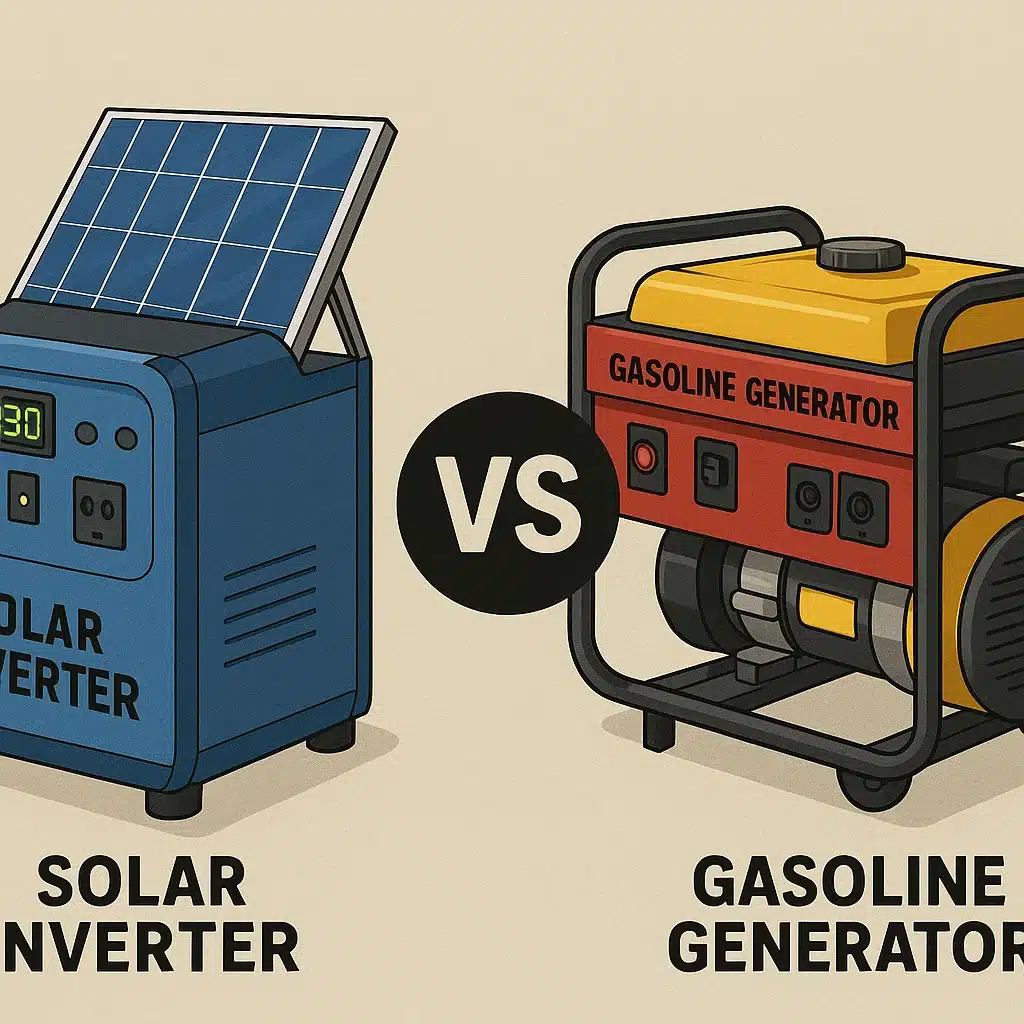Confused about backup power? Solar inverters sound modern, but generators are proven. Choosing wrong costs money and means no power. Let’s clarify which is truly better for your needs.
Generators are often better due to mature, reliable technology and consistent power output, regardless of weather. Solar inverters depend on sunlight and battery storage, which currently have limitations in capacity and safety concerns regarding lithium batteries.
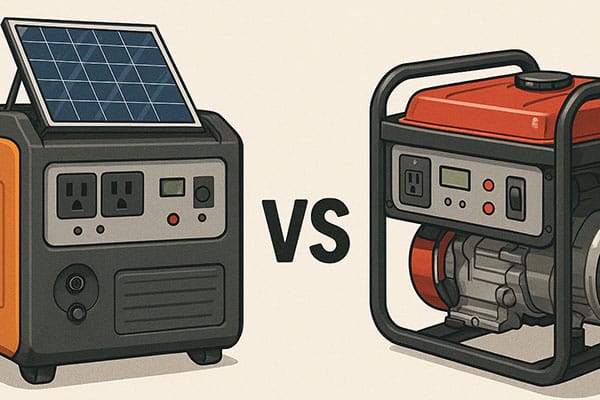
Okay, I lean towards generators based on my experience, especially considering reliability factors crucial for managers. But the "better" choice isn’t always simple. It depends on specific needs and understanding the pros and cons of each. Let’s break down the common questions people ask.
Is a solar inverter better than a generator?
You hear solar is the future, maybe better than generators? But doubts about reliability persist, especially without sun. Let’s directly compare their strengths and weaknesses for backup power.
A solar inverter isn’t inherently "better." It offers clean, fuel-free power when conditions are right. However, generators provide more reliable, on-demand power anytime, anywhere, independent of weather, making them often superior for critical backup needs.
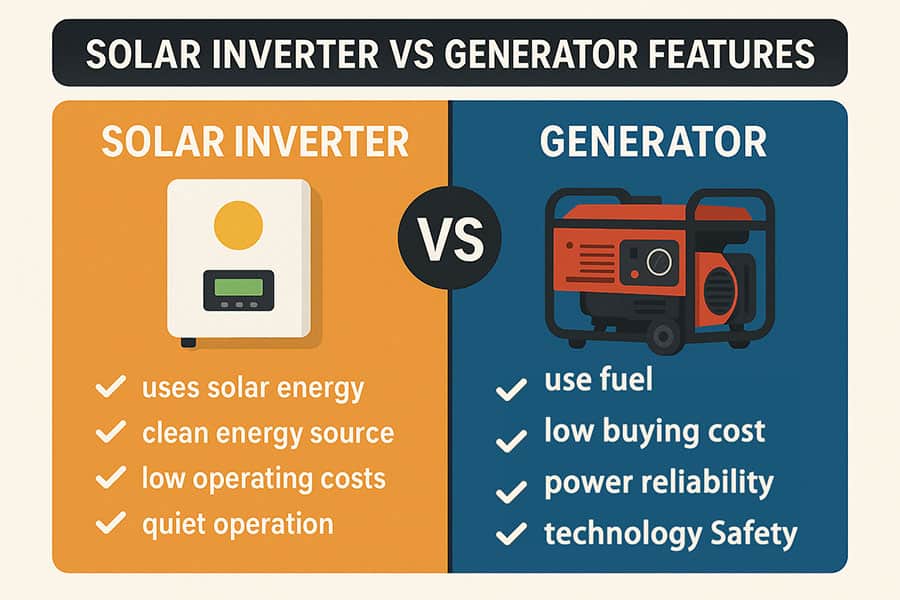
Comparing these two isn’t black and white. It really depends on what you value most. I’ve worked with countless clients, and the priorities often differ. Let’s look closer at how they stack up for someone needing dependable power solutions.
Power Availability and Reliability
Generators provide power instantly, day or night, rain or shine, as long as they have fuel. This is crucial for critical backup. Solar systems rely entirely on sunlight for real-time power or stored energy in batteries. Cloudy days or nighttime severely limit output without adequate battery storage. From my experience, this dependency is a major drawback for pure backup needs.
Technology Maturity and Safety
Generator technology is very mature and well-understood. Components are standardized, and finding parts or experienced service technicians is usually straightforward. Solar inverter technology is robust, but battery storage tech1, especially lithium-ion, is still evolving. As I mentioned from my own insights, there are lingering safety concerns, particularly around lithium battery fire risks2. This is a major consideration for quality-conscious buyers and managers responsible for product safety. Mature generator tech generally presents fewer unknowns.
Operational Needs and Costs
Generators need fuel (gasoline, propane, diesel) and regular maintenance like oil changes and filter checks. Solar systems need minimal maintenance (panel cleaning) but have very high upfront costs for panels, inverter, batteries, and installation. Batteries also have a limited lifespan and require expensive replacement down the line. Generators usually have a much lower initial purchase price but ongoing fuel costs.
Is it better to get a generator or solar panels?
Choosing between a full solar setup and a generator is a big decision. Solar seems eco-friendly, generators offer raw power. Which investment truly provides the reliable backup you need?
For reliable emergency backup power, a generator is often better due to its independence from weather and immediate output. Solar panels (with inverter/batteries) are better for reducing electricity bills over time but less dependable for instant, critical backup needs.
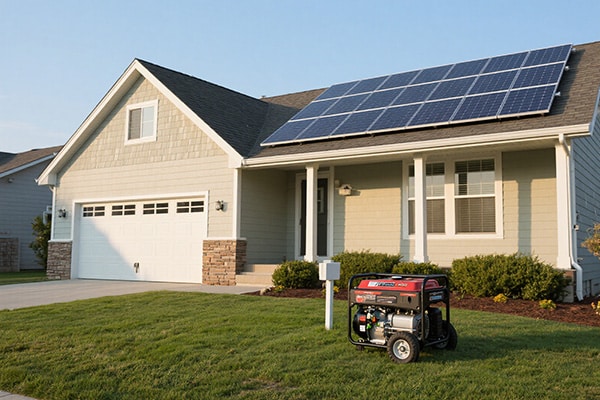
The key difference here often comes down to the primary purpose. Are you looking mainly for emergency power during outages, or trying to reduce your daily electricity costs? My clients often need guaranteed power when the grid fails, which heavily favors generators, especially portable ones for flexibility or standby units for seamless power.
Defining the Primary Use Case
Generators excel at providing power when the grid is down. Their main job is backup. Solar systems with batteries can provide backup, but they are often primarily designed to supplement grid power, reduce electricity bills, and offer some environmental benefits. Their backup capability depends heavily on battery size and charge state when an outage occurs.
Power Output Limitations
Generators come in a huge range of sizes, from small portables powering essentials to large standby units covering an entire building. You can choose one that precisely matches your power needs. As I know from the industry, typical residential solar systems often have practical output limitations, sometimes around 6kW. This cap comes from factors like available roof space for panels, inverter size, and battery discharge rates. This might not be enough to run everything during an extended outage.
Installation, Complexity, and Procurement
Portable generators are relatively simple stand-alone devices. Standby generators require professional installation, but the technology is well-established. Solar systems require significant, specialized installation involving panels, mounting, wiring, inverter, and potentially large battery banks. For purchasing managers like Mike, sourcing generators often involves working with established supply chains for a proven technology. Sourcing complete solar systems can be more complex due to the multiple, rapidly evolving components, especially batteries.
| Feature | Generator (Portable/Standby) | Solar System (with Battery) |
|---|---|---|
| Primary Goal | Emergency Backup Power | Reduce Bills / Offset Grid |
| Reliability | High (needs fuel/maint.) | Moderate (weather/battery) |
| Power Output | Scalable, High Output Easy | Often Limited (e.g., ~6kW) |
| Complexity | Lower/Moderate | High |
| Upfront Cost | Lower/Moderate | Very High |
| Dependency | Fuel | Sunlight / Battery Charge |
What are the disadvantages of solar inverter?
Solar inverters promise clean energy from the sun. But what are the hidden costs or problems? Understanding the downsides is crucial before committing to this technology for critical applications.
Key disadvantages include dependence on sunlight (no power at night/heavy cloud without batteries), high initial cost, limited battery lifespan requiring costly replacement, potential safety concerns with lithium batteries, and often lower peak power output compared to generators.
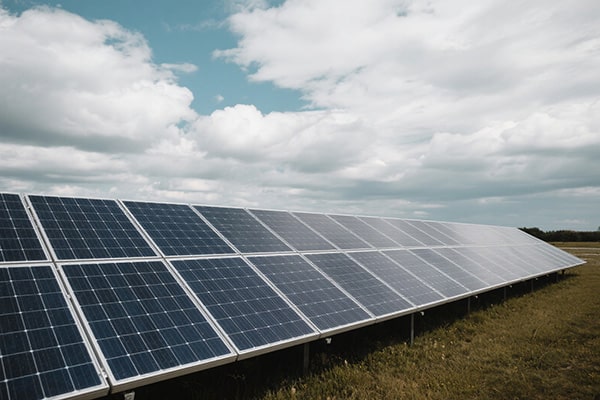
While solar offers attractive benefits like lower emissions and potential long-term savings, overlooking the drawbacks would be a mistake. From a practical standpoint, especially for ensuring business continuity or reliable home backup, these limitations need careful consideration. I always advise clients to weigh these points heavily:
1. High Upfront Investment
The total cost for solar panels, a quality inverter, sufficient battery storage, and professional installation is substantial. It’s typically many times higher than purchasing even a large portable or home standby generator. This initial barrier is significant.
2. Sunlight and Weather Dependency
This is the most fundamental limitation. Solar panels only generate electricity when the sun shines. Output drops significantly on heavily overcast days and is zero at night. Backup power during these times relies entirely on stored energy in batteries, which have finite capacity.
3. Battery Limitations and Costs
Batteries are essential for off-grid use or nighttime backup. They are expensive components with a limited lifespan, often needing replacement every 10-15 years, representing a major future expense. Furthermore, as I highlighted based on my industry insights, the safety of large lithium-ion battery banks remains an area of concern. While risks are managed, potential fire hazards exist, which is a critical factor for product vetting and quality control.
4. Power Output Ceiling
Practical factors like roof space, budget, and inverter capacity often limit the total power output of a residential solar system, sometimes to around 6kW as I mentioned. This might not be sufficient to run large appliances like central air conditioners or well pumps simultaneously during an outage. Generators can be sized more easily to meet higher peak demands.
5. System Complexity
A solar-plus-storage system involves multiple interconnected components: panels, wiring, charge controllers, inverter, batteries, monitoring systems. This inherent complexity increases potential points of failure compared to the relatively simpler mechanical system of a generator. Troubleshooting can also be more involved.
Conclusion
Generators generally offer more reliable, on-demand backup power due to mature tech. Solar systems have benefits but face limitations like weather dependency, high cost, and battery issues for critical backup.

